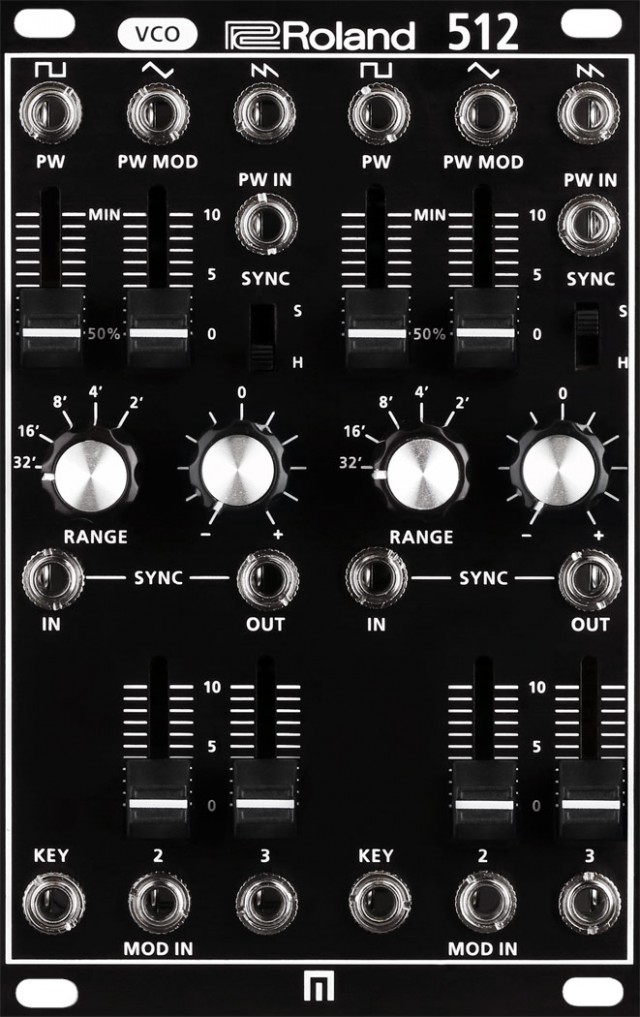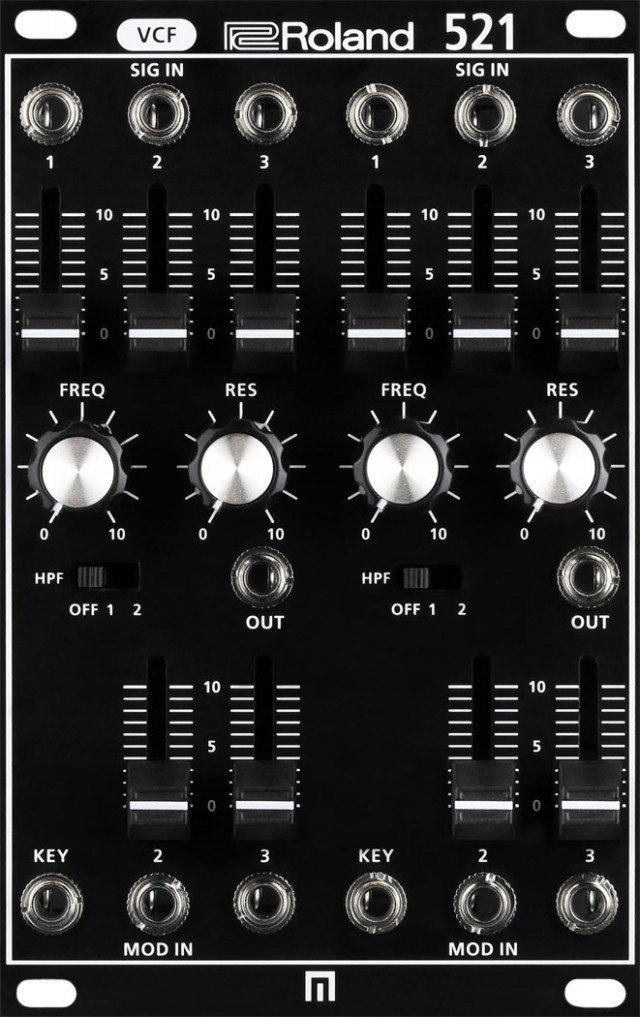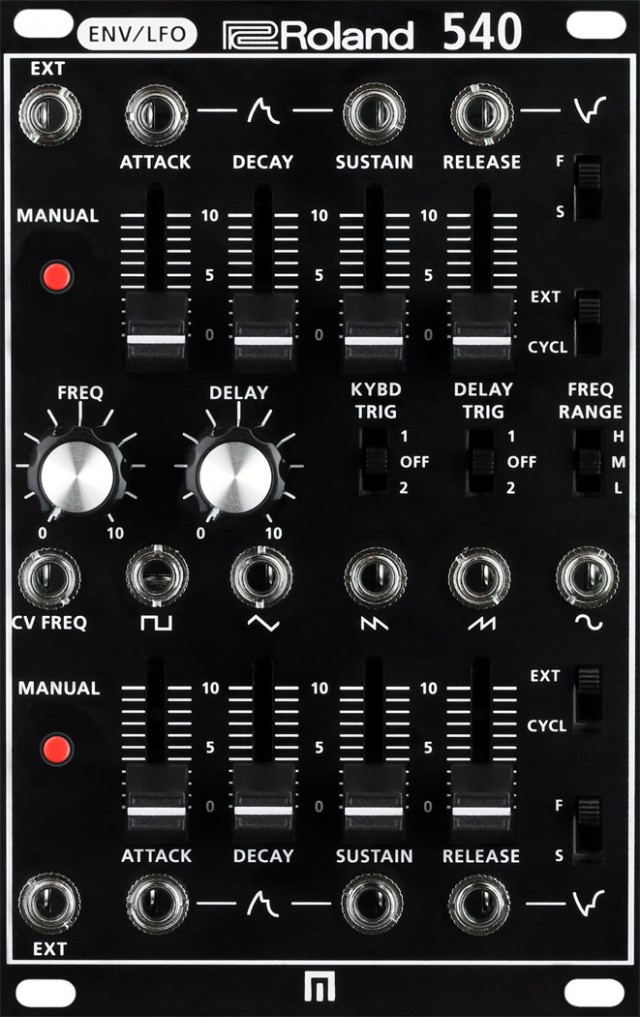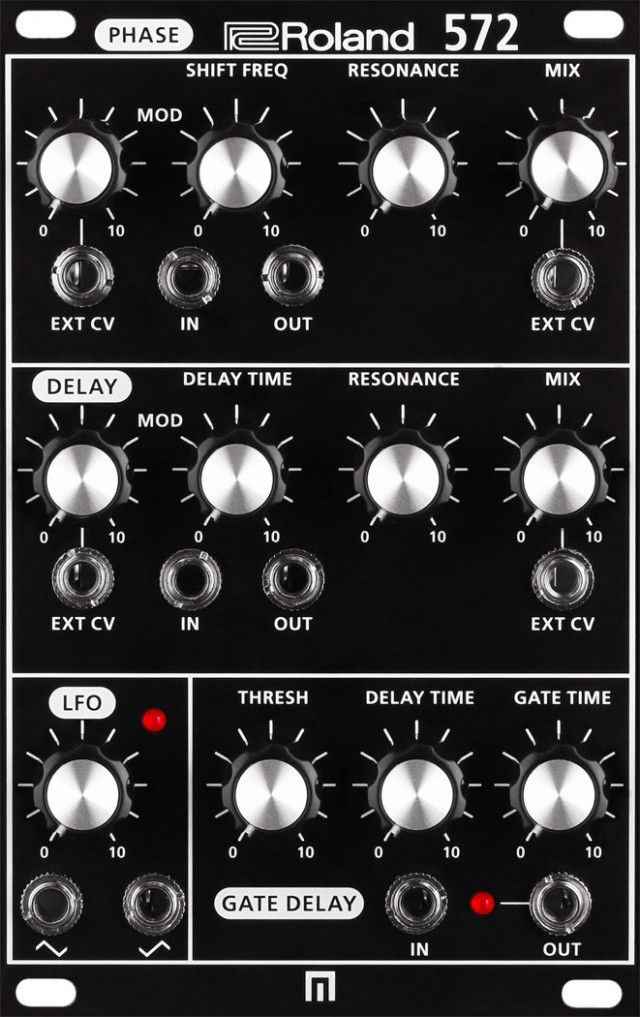
Roland has released official details on their new System-500 analog Eurorack synthesizer modules.
The System-500 is a fully analog recreation, in Euro format, of the classic Roland System-100m modular synthesizer. The modules are produced in collaboration with established Euro manufacturer Malekko Heavy Industry.
According to Roland, the System-500 delivers the ‘classic character and functionality of the original with the advantages of a modern instrument’.
Here’s an overview on the Roland System-100m from the Summer NAMM Show:
Here are the details:

512 DUAL VCO
The 512 Dual VCO (voltage controlled oscillator) is a single module consisting of two voltage controlled oscillators.
Each independent VCO produces frequencies across a wide range with 1V/octave tracking and dedicated pulse, triangle, and saw wave outputs. Variable pulse width is available via panel control or CV modulation. Each oscillator’s frequency can also be synchronized to the other in weak or strong modes to achieve a unique “sync” sound.

521 DUAL VCF
The 521 Dual VCF (voltage controlled filter) module features two separate low pass filters for modifying the timbre of audio sources.
Each filter has its own dedicated controls for frequency cutoff, resonance, and a fixed high pass filter with two switchable cutoff points. Audio and CV input mixers on each channel allow the blending of multiple audio signals and modulation sources.

530 DUAL VCA
The 530 Dual VCA (voltage controlled Amplifier) features two independent voltage controlled amplifiers for controlling the loudness of audio signals.
Each VCA has three sliders for an audio input mixer, three sliders to mix CV inputs, and a selector switch for linear or exponential response modes.

540 DUAL ENVELOPE GENERATOR + LFO
The 540 Dual Envelope Generator and LFO (low frequency oscillator) is a multi-purpose modulation source.
The module features two independent ADSR (attack, decay, sustain, release) envelope sections that produce variable voltages for controlling other Eurorack format synthesizer modules such as oscillators, filters, and VCAs.
Each section can be triggered externally, internally, or manually with dedicated jacks for each envelope, as well as an inverted output.

572 PHASE SHIFTER + DELAY + LFO
The 572 Phase Shifter, Delay and LFO is a time-based, multi-effects module.
The 572 includes a five-stage phase shifter, analog audio delay, a control voltage gate delay, and an LFO. The phase shifter has panel controls for shift frequency and resonance amount that can vary from subtle to a deep, lush analog effect. Similarly, the audio delay has independent knob control of delay time and resonance (or feedback) for short chorus-like modulation delays.
Both the phase shifter and delay can be modulated by the 572’s internal LFO or external CV signals and feature wet/dry effects mix controllable via the front panel or with CV.
The LFO section has a knob for controlling frequency and features both normal and inverted output jacks. The gate delay has knobs to control threshold, delay time, and gate time for modifying incoming gate signals from other modules.
Details on pricing and availability for the Roland System-500 Eurorack modules are to be announced. See the Roland site for details.

Okay Roland, now we’re talking!
Man those are tiny short sliders.
But other than that…Itsa Niiice!
Tiny as they are those sliders look to be about 50% bigger than those on the JP-08. For the Eurorack format they’re not too bad. Those giant pictures do spoil me into wishing for a 5U version, though.
Its a great time to be into synths and electronic music – so much great gear around. Roland JD-XA, System 500, System 1M, and Boutiques; Moog Mother 32s, DSI Prophet 6. Very pleased that Roland is getting back to its analog routes and also embracing modulars. Looking forward to hearing when the System 500 modules will be available and how much they will cost.
the price is written on the moduls (572 Phase Shifter = 572$)
I’ve heard that they MSRP for $299. But I might be mistaken.
I think I heard prices are ‘from’ 299. I’m guessing the phaser/delay/lfo module might be more costly.
Wtf Roland gets it wrong again, awful colour, i can do more on a free ipad app, I cant believe yet again this is a synth that will be over 5 bucks, not something for us mere mortals, these will just end up in some rich lawyer collectors case…. Pah…… One note at a time…pah…..and pah again.
Are you new to synthesis buddy?
What colour do you think the System 500 should be?
Dude has got to be trolling…
Crikey it was an obvious parody of the whining that goes on almost every new synth release post here. Sigh….
Sarcasm doesn’t always travel intact across the Atlantic.
Not sure if that’s true. I can see sarcasm getting lost crossing the Pacific, the largest of the oceanic divisions. But the Atlantic? I don’t believe the distance is so great – especially in the North Atlantic – that sarcasm would suffer greatly from the journey.
Literally impossible to tell.
Okay, to me this sounds like mere rationalization!
Ugh, gimme that price so i have something to complain about !
Is there any bus routing between these like a I think the original 100M had?
Eurorack has built in CV busing if 16 pin cables/jacks are used.
Hardly anyone ever takes advantage of this design aspect though, aside from Doepfer.
Yes, would be great if they did, seems like the perfect situation for it
Look good, but do they sound like a Roland?
Rumors are that this will cost $55,000 for a basic system.
Looks very promising! If the sound is right and the price is “surprisingly affordable” as they say, it should do well. Hopefully well enough to add other modules. I’d like to see a 550: ring mod/noise/S&H/LFO. Welcome back to the company that said it would never go back to analog!
Well, there isn’t too much Roland here other than name on top. As these are made by Malekko. Nothing wrong with that, though.
Except for the original circuit designs.
Had no idea about that, then it makes a difference!
you should fit right in around here
While based on the original schematics Josh Holley collected from Roland, there was evidently substantial translation to make the original circuits work in a modern system, replace the original Roland parts with modern components, and strike the balance between the best features of the System 100 and 700 modules.
Certainly.
The point is that these are based upon old Roland designs and not just badged by Roland just to have some modules to sell.
If this does well and doesn’t have a stratospheric price, I could imagine the Roland renaissance continuing…
Can the modular-smart among you help me out here. With the OSC, Filter and ENV modules, is this ostensibly a two voice synth? Like, not paraphonic—it seems to me like there are essentially two discreet synthesis paths carried throughout all of them.
It’s all about how you configure it. If you want to set this up as a two voice you can as long as you have two separate signals to send in. Often though you may find it useful to have to envelopes, two filters, or two oscillators in one voice. Also there will be times when you may want to use modules for something other than their “intended” purpose. For example using the envelope as an LFO.
Thanks, Joe. Get what you’re saying about having two filters/env/etc available per voice but was mostly curious if I understood what I was looking at. That these come as ‘dual’ modules as standard is pretty interesting to me in that you *can* turn it into a an actual two voice instrument (with less sonic potential, natch) if you need or want to.
Too many confusing knobs and sliders Roland, I just want something digital that is lightweight and made of plastic.